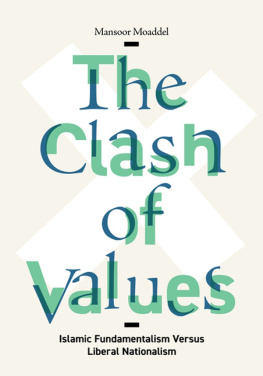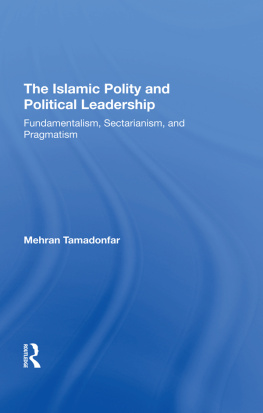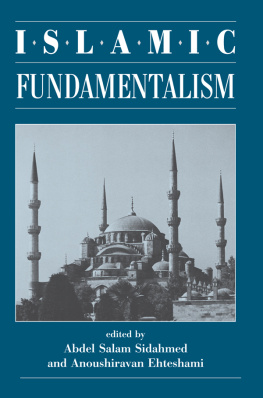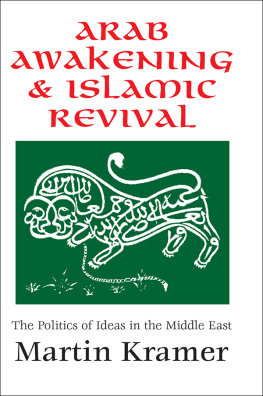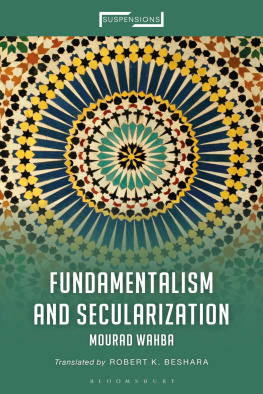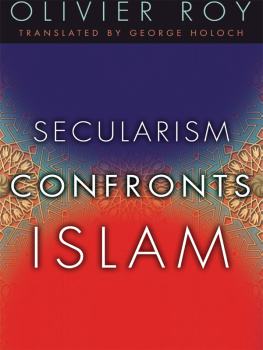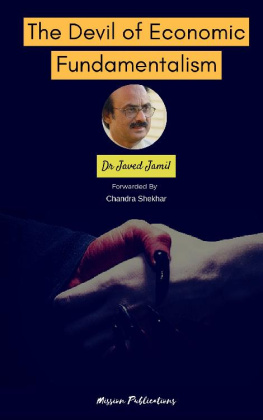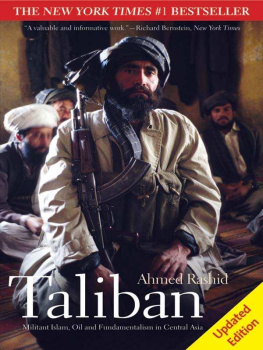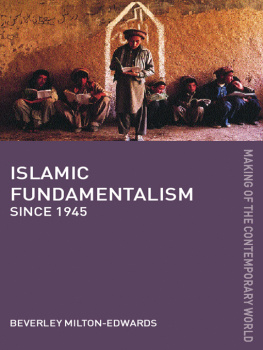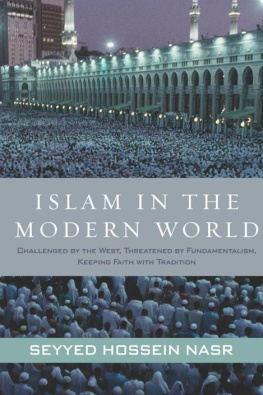Table of Contents
THE CLASH
OF VALUES
THE CLASH
OF VALUES
Islamic Fundamentalism
Versus Liberal Nationalism
MANSOOR MOADDEL
Columbia University Press
New York
Columbia University Press
Publishers Since 1893
New York Chichester, West Sussex
cup.columbia.edu
Copyright 2020 Columbia University Press
All rights reserved
E-ISBN 978-0-231-55052-9
Library of Congress Cataloging-in-Publication Data
Names: Moaddel, Mansoor, author.
Title: The clash of values: Islamic fundamentalism versus liberal nationalism / Mansoor Moaddel.
Description: New York: Columbia University Press, [2020] | Includes bibliographical references and index.
Identifiers: LCCN 2019026382 (print) | LCCN 2019026383 (ebook) | ISBN 9780231193825 (cloth)| 9780231193832 (paperback) | ISBN 9780231550529 (ebook)
Subjects: LCSH: Islam and politics. | Islamic fundamentalism. | Social valuesArab countries. | NationalismArab countries. | LiberalismArab countries. | Arab countriesSocial conditions21st century.
Classification: LCC BP173.7 M62 2020 (print) | LCC BP173.7 (ebook) | DDC 303.3/72091767dc23
LC record available at https://lccn.loc.gov/2019026382
LC ebook record available at https://lccn.loc.gov/2019026383
A Columbia University Press E-book.
CUP would be pleased to hear about your reading experience with this e-book at .
Cover design: Martin Hinze
Dedicated to:
The Girls of Revolution Street, Tehran, Iran

CONTENTS
B etween 1977 and 2018, a series of nonviolent mass movements for democratic change transpired in the Middle East and North Africa, each one appearing more powerful than the previous. Among the most remarkable were, first, the movement of Iranians for a more transparent, democratic, and peaceful government that brought about the reformists success vis--vis the fundamentalists in the 1997 presidential elections and then the 2009 Green Movement, which was not only more massive but also quite daring in challenging the absolutist power of the ruling cleric in the country. Two years later the region experienced a sequence of upheavals in virtually every Arab country. Aptly labeled the Arab Spring, these movements managed to unseat entrenched dictators in Egypt, Libya, Tunisia, and Yemen in 2011. Finally, in 2018, Iran experienced the outbreak of nationwide demonstrations against both the emaciated reformist movement and political Islam, displaying favorable attitudes toward the formation of a secular liberal government.
Analyzing the data from full-scale cross-national and longitudinal surveys, this book assesses the extent to which these movements reflected, and are reinforced by, the profound changes in peoples value orientations toward some of the most important principles of social organization and weather these changes signified the decline of Islamic fundamentalism and the rise of liberal nationalism in the Middle East and North Africa. To make this assessment possible, many individuals, organizations, and foundations contributed to the research projects that conceptualized the key constructs related to human values, measured these constructs through a series of survey questions, and collected data from nationally representative samples of respondents in seven countries: Egypt, Iraq, Lebanon, Pakistan, Saudi Arabia, Tunisia, and Turkey. I would like to begin by thanking the members of the research team, for which I was the principal investigator, at the Institute for Social Research (ISR), University of Michigan: Arland Thornton (co-principal investigator), Stuart Karabenick, Linda Young-Demarco (project manager), Julie de Jong (research associate), and Judy Baughn as well as by expressing gratitude to the ISR sampling experts Steven G. Heeringa and Zeina Mneimneh for their assistance and advice. Many thanks also to Gaye Bugenhagen, Karina Havrilla, Zinia Garcia, and other staff at the Sociology Department, University of Maryland, for their administrative support and hard work to ensure the departments smooth functioning; Kristine Ajrouch, Brian Anderson, Caryn Charter, Susan Campbell, and, with fond memories, the late Alethea Helbig from Eastern Michigan University; Matthias Koenig, University of Gttingen, Germany; and many individuals in the survey research firms in the Middle East and North Africa that were involved in the collection of empirical data: Abdul-Hamid Abdul Latif, director of the Egyptian Research and Training Center (ERTC), and Fatma El-Zanaty, president of El-Zanaty & Associates, Egypt; Munqith Dagher, chairman of the Independent Institute for Administration and Civil Society Studies (IIACSS), Iraq; Jean Kors, managing director of the International Center for Organizational Development (ICOD), Lebanon; Farooq Tanwir, University of Agriculture, Pakistan; Majid Jahangir and Tony Proudian, Pan Arab Research Center, Saudi Arabia; Mohamed Ikbal Elloumi, general manager of ELKA Consulting, Tunisia; and Caglayan Isik and Mert Teoman, Frekans Research, Turkey.
Foremost, I am grateful to the National Science Foundation for its continued support of my cross-national survey projects over the years in Egypt, Iran, Iraq, Jordan, Morocco, and Saudi Arabia and of the second wave of the panel survey in Egypt and Turkey (NSF Grant ID 1458953, 0748835, 0701376, 0522174, 0433773, 0338077, 0242861, 0139908); the Ford Foundation for contributing to the 2001 survey in Egypt; the World Values Survey Association and the Banks of Sweden Tercentenary Foundation; the Office of Naval Research (N00014-14-1-0579, N00014-09-1-0985) for its generous grant; the Air Force Office of Scientific Research (AFOSR); United States Africa Command (AFRICOM); the Jack Shand Research Grant and the Society for Scientific Study of Religion; the Max Planck Institute for the Study of Religious and Ethnic Diversity and University of Gttingen in Germany; and Economic Research Forum, Cairo, Egypt, which together provided funding for cross-national and longitudinal surveys in Egypt, Iraq, Lebanon, Pakistan, Saudi Arabia, Tunisia, and Turkey. I am also indebted to Gary Kollmorgen and Ivy Estabrook from the Office of Naval Research; Stacy Faulkenberry from AFRICOM; John Boiney and Barry Costa from MITRE Corp.; retired Captain Dylan Schmorrow, assistant director, Human Systems, Office of the Secretary of Defense; and Major Lyle (Lucky) LaCroix, governance officer, CETCOM Iraq, for their support and advice.
Comments on the manuscript from Arland Thornton, Val Moghaddam, and Sohrab Behdad, as well as from anonymous reviewers for Columbia University Press, are gratefully acknowledged, and special thanks go to Erick I. Schwartz, editorial director, Lowell Frye, associate editor, and Marielle T. Poss, director of editing, design, and production, and Martin Hinze and Julia Kushnirsky for the cover design at Columbia University Press, and Ben Kolstad, editorial services manager, and Sherry Goldbecker copyeditor at Cenveo publisher services. Sherry Goldbeckers editorial work was thorough and effective; she left no stone unturned. I am grateful to Han Kleman, my research assistant, for helping in data analysis and to my students in classes on Researching the Middle East and Ideology and Social Conditions in the Making of Terrorism that I taught at the University of Maryland. Their questions and comments not only helped me improve and clarify the ideas presented in this book but also made my experience at the university truly enjoyable. I would like to thank Elizabeth (Izzy) Petty and Patricia (Trish) Petty for their hospitality at their house in Maine in the summer of 2018 and 2019; its relaxing atmosphere put mind at ease, and I was able to make substantial progress in completing this book. Finally, I am grateful to my wife, Marjan; my children, Armin, Nilufar, and Payvand; and my grandchildren, Oliver and Reza, for their love and support. Needless to say, none of these individuals or institutions bears responsibilities for the shortcomings, errors, and opinions expressed in this book.

